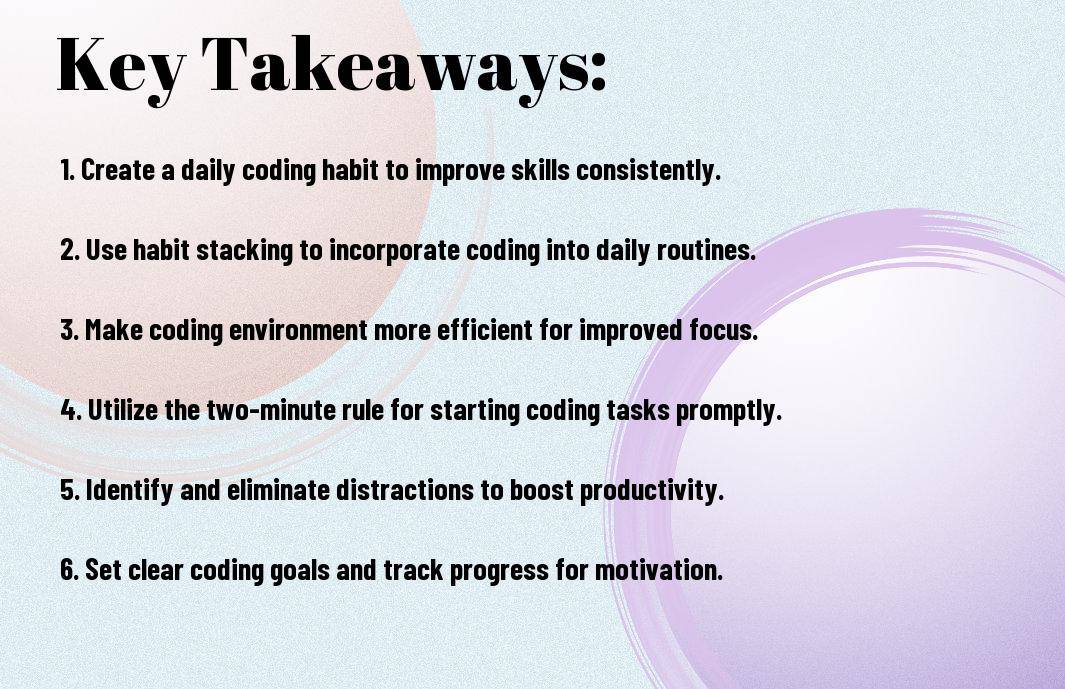Efficiency is crucial for software developers looking to excel in their roles. Implementing the principles of Atomic Habits can significantly enhance their productivity and effectiveness. Whether it’s optimizing code, managing time better, or fostering a growth mindset, incorporating small, positive habits can lead to substantial improvements in performance.
Key Takeaways:
- Implement small changes: Focus on making small improvements consistently, which can lead to significant efficiency gains over time.
- Practice habit stacking: Pair a new habit you want to form with an existing habit to make it easier to adopt and maintain.
- Set clear goals: Define specific, measurable goals that align with your desired outcomes to stay focused and motivated.
- Track your progress: Use tools like habit trackers or project management software to monitor your habits and productivity levels.
- Create a productive environment: Organize your workspace, minimize distractions, and set up systems that support your workflow and habits.
- Focus on consistency: Build routines and stick to them to establish efficient habits that become second nature over time.
- Reward yourself: Celebrate small wins and milestones to reinforce positive habits and keep yourself motivated on the journey to maximizing efficiency.

Understanding Atomic Habits
There’s a plethora of valuable insights that developers can apply from the book “Atomic Habits” by James Clear. If you’re interested in diving deeper into a comprehensive summary of the book, check out this Atomic habits book summary – Learnings of a developer.
The Fundamentals of Atomic Habits
With Atomic Habits, the key lies in understanding the power of small changes over time. James Clear introduces the concept of tiny, incremental improvements that compound into remarkable results over the long term. By focusing on small habits and making them automatic, individuals can steadily progress towards their goals with less resistance and effort.
Why Atomic Habits Work for Everyone
An crucial aspect of why Atomic Habits are effective for individuals across all professions, including software developers, is the emphasis on the science of behavior change. James Clear uncovers the psychology behind habit formation and how our environment shapes our actions. For instance, the idea of “cue, craving, response, reward” loop highlights the importance of creating cues that trigger positive behaviors and designing a rewarding system to reinforce them. This approach can help developers optimize their workflow, boost productivity, and enhance overall efficiency.
For instance, the habit of taking regular breaks to rest and recharge during intense coding sessions can prevent burnout and improve focus and creativity in the long run. By incorporating Atomic Habits techniques into daily routines, software developers can cultivate a more sustainable and productive work ethic.
Laying the Foundation
To Atomic Habits Review – Why every programmer should …, efficiency is crucial for software developers to succeed. By implementing techniques outlined in “Atomic Habits” by James Clear, developers can lay a strong foundation for improving their productivity and achieving their goals.
Identifying Your Current Habits
One of the first steps towards increasing efficiency is to identify your current habits. Take some time to reflect on the routines and behaviors you engage in daily. Look for patterns that may be hindering your productivity, such as procrastination, multitasking, or excessive time spent on non-necessary tasks. Once you have a clear understanding of your habits, you can begin to make positive changes that will lead to greater efficiency.
Establishing Your Efficiency Goals
Establishing efficiency goals is necessary for making progress in your development journey. Define specific and measurable objectives that you want to achieve, such as reducing code review time, increasing lines of code written per day, or improving time management skills. For instance, you may set a goal to spend less time on social media during work hours to increase your focus and productivity. By setting clear goals, you can track your progress and stay motivated to make improvements.
The Four Laws of Atomic Habits Applied to Software Development
Making It Obvious: Setting Up Your Environment for Success
Unlike other industries, software development poses unique challenges where distractions are abundant, and focus is crucial. The key to success lies in setting up your work environment for maximum productivity. Ensure your workspace is free of clutter, with imperative tools within arm’s reach. Using productivity apps like Trello or Notion can help you organize tasks effectively.
Making It Attractive: Creating Appealing Routines
For software developers, routines play a significant role in fostering productivity and creativity. For instance, starting your day with a short meditation session or a brisk walk can set a positive tone for the hours ahead. Incorporating small rewards within your routine, such as taking a coffee break after completing a challenging task, can make work more appealing.
It’s imperative to find routines that resonate with you personally to maintain consistency. Whether it’s listening to your favorite music playlist while coding or setting specific times for brainstorming sessions, make sure your routines align with your preferences and goals.
Making It Easy: Streamlining Your Workflow
Creating a seamless workflow is key to efficient software development. Understanding your most productive hours and structuring your workday around them can significantly impact your output. Utilize tools like IDE plugins, code snippets, and keyboard shortcuts to streamline repetitive tasks and optimize your workflow.
With respect to making tasks easier, automation is your best friend. Implementing continuous integration and deployment practices can save you valuable time and reduce the chance of errors in your code. By simplifying your processes, you can focus on the creative aspects of development without being bogged down by manual tasks.
Making It Satisfying: The Reward System in Development
Software development can be a challenging field, often requiring long hours and intense concentration. Software developers can benefit greatly from implementing a reward system to stay motivated and engaged. Celebrate small victories, like fixing a tricky bug or completing a complex feature, to keep morale high.
Plus, linking rewards to your development milestones can help you stay on track and push through challenging periods. Whether it’s treating yourself to a nice meal after a successful project launch or taking a well-deserved day off after meeting a deadline, find ways to reward yourself for your hard work.

Habit Stacking for Coders
What Is Habit Stacking?
Now, have you ever wished you could effortlessly incorporate good habits into your routine as a software developer? Habit stacking might just be the technique you need. Habit stacking is a strategy that involves attaching a new habit you want to build onto an established habit you already have. By linking a new behavior to a consistent part of your daily schedule, you can make it easier to stick to and ensure it becomes second nature over time.
Practical Examples of Habit Stacking for Software Projects
For software developers, incorporating habit stacking into your workflow can greatly enhance productivity and efficiency. Imagine if every time you open your IDE in the morning, you also set aside 10 minutes to review your tasks for the day or write down key objectives. By connecting the habit of planning with the action of launching your development environment, you can kickstart your day with purpose and focus.
Habit stacking can also be as simple as associating code reviews with grabbing a coffee or scheduling automated tests to run during your lunch break. These small but impactful adjustments to your routine can lead to significant improvements in your coding projects and overall output. By intentionally pairing habits together, you can make progress in your work while optimizing your time and efforts for maximum results.
The 2-Minute Rule for Starting New Tasks
Despite our best intentions, starting a new task can sometimes feel daunting. This is where the 2-Minute Rule, as outlined in Atomic Habits by James Clear, can be a game-changer for software developers looking to boost their efficiency.
Overcoming Procrastination
Any software developer is familiar with the temptation to procrastinate, whether it’s checking emails, scrolling through social media, or getting lost in non-imperative tasks. The 2-Minute Rule suggests that any task can be started if you break it down into a two-minute beginning. By taking the smallest possible step to start a new task, you can overcome procrastination and build momentum towards completing it.
Small Steps to Big Changes in Productivity
Procrastination can be a huge obstacle to the productivity of software developers. By breaking down tasks into small, manageable steps, developers can make progress consistently and efficiently. Clear emphasizes that these small steps may seem insignificant at first, but they can lead to significant changes in productivity over time.
To make the most of the 2-Minute Rule and implement small steps for big productivity changes, software developers can start by identifying tasks that often lead to procrastination. By breaking these tasks into smaller parts and committing to just two minutes of work on them, developers can build a habit of starting tasks without feeling overwhelmed by the entire workload.
Tracking Progress and Maintaining Motivation
The Role of Habit Trackers for Developers
For software developers looking to enhance their efficiency, tracking progress is a key component of the process. Habit trackers can be invaluable tools in this journey. These tools allow developers to monitor their daily habits and work patterns, providing valuable insights into areas where improvements can be made.
Tracking progress through habit trackers enables developers to identify patterns, set achievable goals, and measure their growth over time. By using habit trackers consistently, developers can develop a clearer understanding of their work habits and make necessary adjustments to boost productivity and efficiency.
Celebrating Small Wins Along the Way
Motivation plays a crucial role in the success of software developers. Celebrating small wins along the way is a powerful technique that can help developers stay motivated and focused on their goals. Recognizing and celebrating small achievements can boost confidence, morale, and overall productivity. It is important for developers to acknowledge and appreciate their progress, no matter how small, as it reinforces positive habits and encourages continued growth.
Scaling Up: Compound Growth in Your Efficiency
Once again, as software developers, improving our efficiency is a continuous journey. By implementing the principles of Atomic Habits, we can experience compound growth in our effectiveness over time. One of the key aspects of this process is focusing on consistency over intensity.
Consistency Over Intensity
Growth in efficiency is not about making drastic changes overnight. It’s about developing small, sustainable habits that accumulate and lead to significant improvements in the long run. By consistently practicing efficient habits in our work routines, we can gradually increase our productivity and effectiveness without feeling overwhelmed.
The Long-Term Impact of Marginal Gains
Scaling our efficiency through marginal gains can have a profound impact on our overall performance as software developers. By making small improvements in our processes, such as refining our coding practices or optimizing our project management techniques, we can steadily enhance our efficiency over time. It is vital to remember that these incremental changes may seem insignificant at first, but they can lead to remarkable results in the long term.
Adapting to Change and Overcoming Plateaus
Your journey to increased efficiency as a software developer using Atomic Habits techniques is a continuous process of growth and adaptation. To dive deeper into this topic, check out My thoughts on Atomic Habits | Łukasz Chrząszcz Dev Blog.
When and How to Review and Adjust Your Habits
Change is inevitable, and your habits will need to evolve accordingly. It’s crucial to periodically review and adjust your habits to ensure that they align with your current goals and circumstances. Reflect on what’s working well and what can be improved. Be open to making changes that will keep you on the path to success.
Strategies for Continuous Improvement
With a growth mindset, you can implement strategies for continuous improvement in your habits. Tracking your progress, seeking feedback from peers, and experimenting with new techniques are all valuable approaches. Remember that small, consistent adjustments can lead to significant positive outcomes in the long run.
Stay committed to your development journey, and don’t be afraid to overcome any plateaus or setbacks along the way. Embrace challenges as opportunities for learning and growth, and celebrate your progress no matter how small. By staying resilient and adaptable, you can reach new levels of efficiency and excellence in your software development endeavors.
Summing up
Considering all points, software developers can greatly benefit from implementing the Atomic Habits techniques to improve their efficiency. By focusing on small, consistent changes, they can establish powerful habits that lead to long-term success in their work. Whether it’s optimizing their workspace, establishing a daily routine, or setting clear goals, these techniques provide a practical framework for developers to enhance their productivity and achieve their professional goals.
FAQ
Q: What are Atomic Habits techniques for software developers’ efficiency?
A: Atomic Habits techniques are practical strategies to help software developers become more efficient by focusing on small, incremental changes that can lead to significant improvements over time.
Q: How can software developers benefit from using Atomic Habits techniques?
A: Software developers can benefit from Atomic Habits techniques by developing positive habits, breaking bad habits, increasing productivity, and achieving their goals more effectively.
Q: What is the importance of building atomic habits as a software developer?
A: Building atomic habits as a software developer is necessary because small, consistent actions can have a cumulative impact on your efficiency, performance, and overall success in your career.
Q: How can software developers establish atomic habits in their daily routine?
A: Software developers can establish atomic habits in their daily routine by starting small, being consistent, tracking their progress, and adjusting their habits as needed to optimize efficiency.
Q: What are some examples of atomic habits that software developers can implement?
A: Examples of atomic habits for software developers include setting specific coding goals each day, taking short breaks to improve focus, practicing code reviews regularly, and organizing tasks using a productivity tool.
Q: How long does it typically take for atomic habits to become ingrained in a software developer’s routine?
A: It typically takes about 21 days for a new habit to become ingrained in a software developer’s routine, but this can vary depending on the individual and the complexity of the habit being formed.
Q: What are some additional resources that software developers can use to learn more about Atomic Habits techniques?
A: Software developers can explore books like “Atomic Habits” by James Clear, online articles, podcasts, and videos that provide valuable insights and practical tips for implementing Atomic Habits techniques in their daily lives for improved efficiency.



